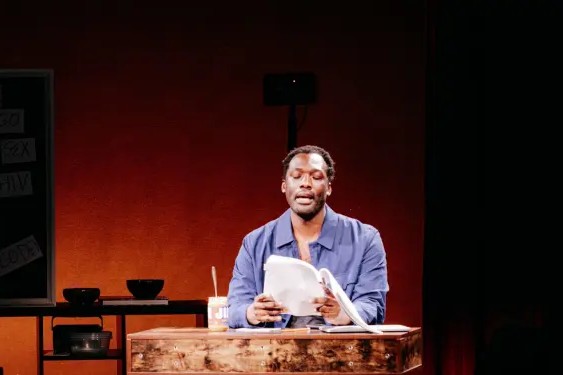Coming to the stage with a New Yorker signature tote bag, Ngofeen Mputubwele begins ‘The Monkeypox Gospel’ with a career breakthrough: his first major assignment for The New Yorker, covering the global outbreak of monkeypox. His roots trace back to Congo, the same roots for the virus, while his present is in New York City, where queer communities felt the outbreak’s force most immediately. It seems almost fated that he should be the one to tell this story.
Yet destiny comes with danger. He has only just loosened himself from the grip of a strict church, abandoning a vow of lifelong singleness. Taking on this assignment means more than writing about a virus. It means risking exposure of his own truth: his sexuality, his choices, the unsteady new life he is still learning to inhabit. The story he tells is layered. It is about vaccines and virology, but also about colonial legacies that continue to shape the global health system. At its core, it is about fear and love, about conflicts and belonging somewhere, about finding peace within a loving community.
On stage, Mputubwele carries a warmth that softens the sharp edges of his subject. His voice has a generosity that draws the listener in, and the recorded fragments he stitches into the performance, interviews, voicemails, moments of private reflection, carry tenderness, queerness, and love, reflecting the community he is in. Yet this expansiveness sometimes becomes a burden. He weaves together the personal with the political, family stories with historical ones. In his hands, today’s monkeypox crisis converses with past epidemics, from HIV to COVID-19. The juxtapositions are clever and thought-provoking, but the rapid leaps can make the thread difficult to follow.
The form of the piece mirrors its thematic sprawl. Interviews, news audio, and voicemails collide. There are also moments where he sings along with Verdi’s La Traviata or dances with Tchaikovsky’s ballet music. As captivating as they are, these flourishes feel strange in the middle of a show shaped by the intimacy of podcast storytelling with sound. The soundscape he crafts is lush and immersive, textures folding over one another until the audience feels submerged in a sea of voices. Yet this abundance occasionally blurs his central message.
What ultimately shines is his determination to place his personal journey of faith, identity, and sexuality within a wider political and historical frame. The ambition is striking, and the courage it requires is evident. But ‘The Monkeypox Gospel’ can benefit from sharper focus. After all, it is a one-hour story, not a ten-episode Netflix series. Some side narratives, while compelling, dilute rather than deepen the impact. With clearer storytelling choices, Mputubwele could allow the personal and political to merge more seamlessly, giving his audience a work that stays with them long after they leave.
‘The Monkeypox Gospels’ has finished its Fringe run


Comments